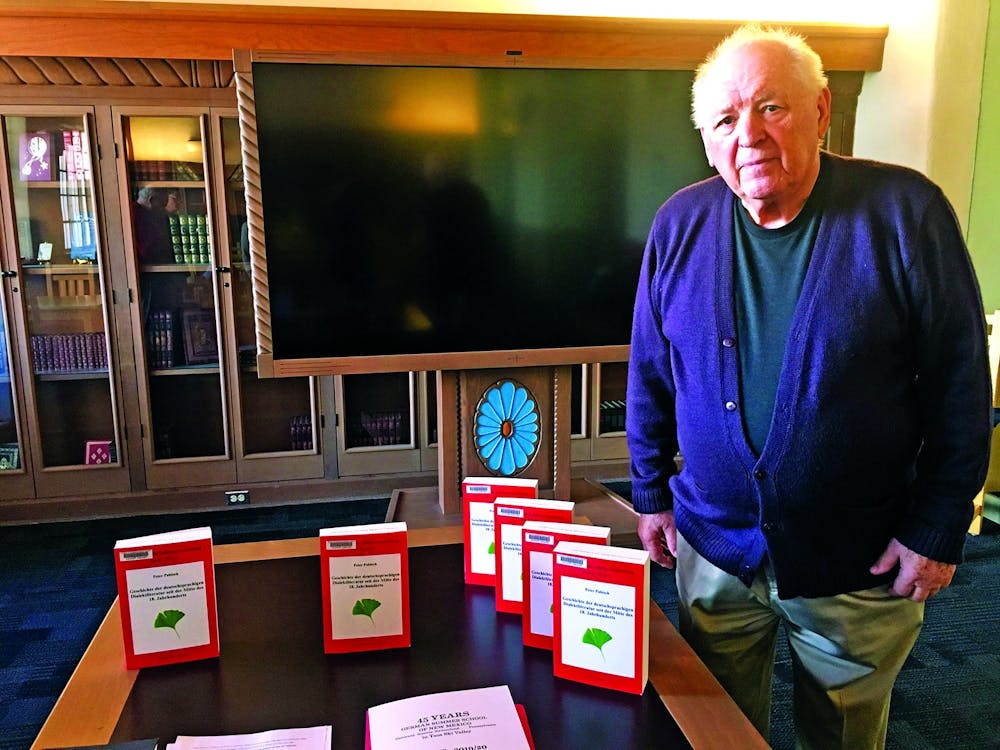The University of New Mexico is now home to the first worldwide collection of research in German dialect literature in Zimmerman Library.
UNM Professor Emeritus of German Peter Pabisch began writing his book "The History of German Dialect Literature Since the Middle of the 18th Century" in 2012. What originally was only supposed to be one book on the research of dialect turned out to be a six volume collection that took eight years to be published.
One reason why Pabisch said he wrote the books was because the German language has such a deep background of sub-languages, and communicating between different regions is very difficult with the several different dialects of German.
"The fact is that the dialect has not — and will not — disappear," Pabisch said on Feb. 5 at his book presentation in Zimmerman Library.
Standard German is the universally accepted official language taught in schools and used in German government or other formal instances, but Pabisch said the German language most commonly spoken in local pubs or on the street is an entirely different dialect, depending on what region you're in.
While working closely with Fine Arts and Design Library Operations Manager Aaron Blecha, Pabisch was given an office on the third floor of Zimmerman where he used extensive library research to create this comparison of literature dialects.
"This was an intensive and long research and writing process and one of the longest I’ve ever (borne) witness to," Blecha said. "I've seen people complete Ph.D.s and other things in a shorter amount of time than what Peter spent writing this work. It utilized the entire spectrum that the library has to offer."
Blecha said one of the reasons why these books were written at UNM is because the library already had a large collection of German literature and resources, which Pabisch played a big part in contributing to. He also said that 20% of the population in New Mexico claims to have German history. Readers would consist largely of German graduate students, but Blecha said people with German heritage might also take a personal interest in the books as well as more serious scholars.
The six books are written entirely in German, but only the first two are written in standard German. Books four through six contain the actual texts of over 160 German authors writing in many different dialects. The books add up to a total of more than 3,300 pages and are now on permanent display as part of the reference collection at Zimmerman. Each individual book is about 560 pages.
The first book contains the entirety of research conducted by Pabisch with a total of seven chapters. The first four chapters describe the purpose of the collection and explain the value and recognition of different dialects used in German literature. Pabisch said how there was low German dialect in the flat parts of Northern Germany and upper German dialect in the high Alps. Between these two regions are a wide range of sub-languages that Pabisch says Martin Luther tried to unite by creating the Lutheran Bible in standard German.
The first book also gives a regional description of the different eras of literature used in the four books of dialect. The texts provide a range of dialectal throughout World War I to the start of the 21st century. The last chapter gives a one to two-page introduction of all 160 authors used in the last four books.
Since the texts in the last four books are so extensive, Pabisch puts things like glossaries, appendices and bibliographies into the second book, as well as any other maps or photographs that support the literature in the last four texts.
Get content from The Daily Lobo delivered to your inbox
This collection of dialects was published in the fall of 2019 by Joachim Weidler in Berlin, Germany. It is expected to appear in university libraries around Germany as part of a German Research Series, edited by Professor Emeritus Hans-Gert Roloff from the Free University of Berlin.
Daniel Ward is the culture editor at the Daily Lobo. He can be contacted at culture@dailylobo.com or on Twitter at @wordsofward34






